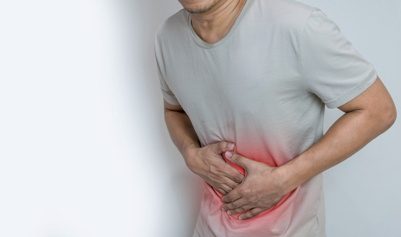Ulcers are becoming a popular household term as people’s lifestyle worldwide is undergoing a complete upheaval, with many choosing fast food, alcohol, and caffeine daily over a vitamin- and protein-rich diet.
One of life’s simple joys is sitting with the family to enjoy a nice meal. However, eating might become uncomfortable if you have a peptic ulcer, often known as a stomach ulcer.


An open sore or blister, known as an ulcer, is a rupture in the skin or mucous membrane that cannot heal itself. Ulcers can develop either inside or externally in a person’s body.
An ulcer is classified into two types based on where it occurs in the body.
- If the ulcer is found in the duodenum (at the top end of the small intestine), it is called a duodenum ulcer.
- And if the ulcer is found in the stomach, it is called a stomach or gastric ulcer.
The imbalance of digestive juices is the primary reason for an ulcer.
While the first layer of the stomach’s inner lining is where most ulcers are discovered, a perforation a hole that extends through the stomach or duodenum can also cause an emergency.
Causes of Ulcers:
The mucus covers the digestive tract to shield it from the digestive acids. An ulcer develops when the amount of mucus decreases or when the amount of digestive acid rises.
The two common causes of ulcers are:
- Over usage of non-steroidal anti-inflammatory drugs: People who have been on the pain-reliever medication for a longer period or in a large dosage are prone to ulcers as the medicines block the body from making the chemical that helps protect the inner walls of the stomach and small intestine from digestive acid.
- Through Bacteria: Stomach ulcers can develop due to Helicobacter pylori bacterial infection. Though many of us carry this bacterial infection in the stomach, we don’t get ulcers. But for some, the bacterial overgrowth raises the acid level, breaking down the mucus layer to irritate the digestive tract.
An individual’s risk of having a stomach ulcer is increased by lifestyle factors, such as smoking and alcohol consumption.
Symptoms of Ulcers:
Some stomach ulcers may not show any symptoms. These stomach ulcers are often known as “silent ulcers.” But this only happens with some.
Generally, on an empty stomach, the person having an ulcer issue can have a searing ache or discomfort between the breastbone and belly button might be felt.
Food intake or taking an antacid may temporarily relieve the pain, but it will soon return. The discomfort may come and go for several days or weeks, lasting only a few minutes or hours.
The other ulcer symptoms would include:
- Bloating
- Nausea
- Vomitings
- Weight Loss dues to loss of appetite.
- Indigestion
- Excessive belching
- Heartburn/Acid Reflux.
Small ulcers could go unnoticed for a while as they don’t show severe symptoms at the start. However, upon noticing the symptoms, it is advisable to take help from the doctors.
Getting a diagnosis and assistance at an early stage can help you stop the problem from getting worse.
Managing Ulcers with the help of Essential Nutrients:
- Zinc
Ulcers heal more quickly because of the vital vitamin zinc. Additionally, it strengthens resistance to infection, which is one of the elements that contribute to ulcers. A strong immune system blocks the bacteria’s ability to grow and harm the lining, preventing ulcers. Additionally, it has been discovered that zinc helps the lining of the stomach develop new cells.
- Selenium
Selenium and zinc work together to strengthen the immune system, preventing ulcer recurrence and promoting ulcer healing.
- Anti-oxidants
Vitamin A is an anti-oxidant that aids in replacing damaged cells with new ones. Along with flavonoids, they aid in preventing the oxidative stress that the digestive system experiences due to the inflammation brought on by ulcers. The flavonoids also aid in preventing H. pylori from spreading.
- Fiber
It has been observed that consuming enough soluble and insoluble fiber reduces the chance of developing ulcers. On the other hand, it is indicated that a diet low in fiber increases the risk of developing ulcers. When bile and gastric secretions are concentrated in the gut, they can exacerbate the symptoms of an ulcer. However, fiber helps to dilute them.
- Probiotics
Probiotics, which contain beneficial strains of lactobacillus bacteria, stop the growth and spread of ulcer-causing bacteria like H. pylori. Additionally, they shield the stomach lining from harm.
- Vitamin-C
Vitamin C helps the wound heal more quickly and prevents blood loss, making it more effective against bleeding ulcers.
- Fluid Intake
Adequate fluid consumption speeds up gastric emptying, which keeps the concentrated gut contents from lingering in the stomach for too long. They dilute the gastric discharge’s concentrated content.
Homeopathy Treatment for Ulcers
When ulcers go untreated for a long period, they can result in serious side effects such as internal bleeding, a blockage in the food’s path to the intestines, a perforation or hole in the stomach, and stomach cancer.
In the current era of conventional medicine, the root cause of the medical condition is never focused upon, and the treatment is given to suppress the symptoms or the effects. But, with safe and effective homeopathy, ulcers can be effectively treated by analyzing the patient’s symptoms. It is advised not to take homeopathic medication without the directions and oversight of a specialist homeopath.
Dr Positive Homeopathy offers top-notch homeopathic ulcer therapy that pinpoints the underlying cause of any ulcer and treats them, providing relief from the condition. Dr. Positive Homeopathy’s constitutional therapy has already been demonstrated to be incredibly effective in curing several Ulcer instances.








